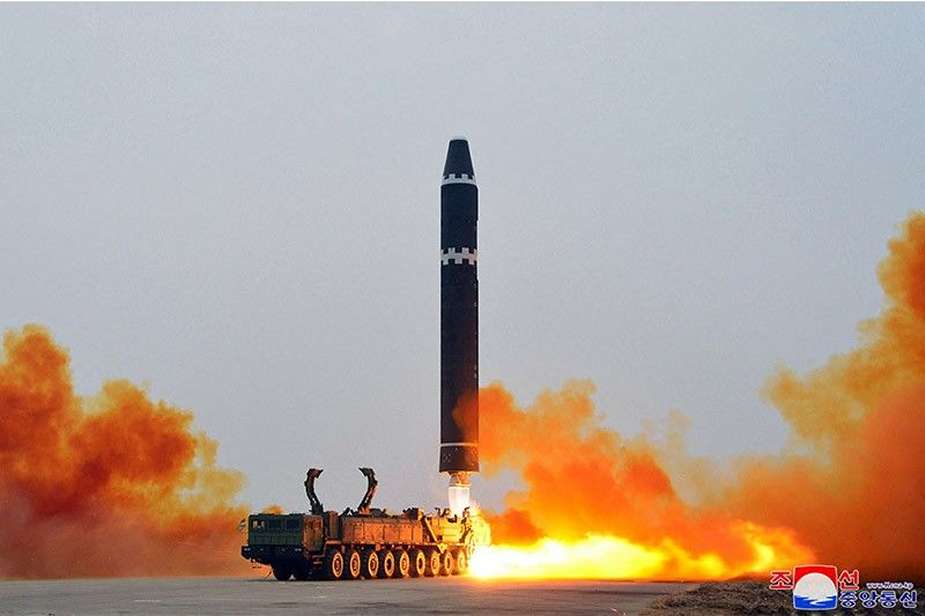Breaking news
North Korea's research partnerships breach UN sanctions to advance military tech.
Agienza Nova reports that North Korea has collaborated with other nations on research projects to advance its missile and military technology capabilities. This revelation comes from an investigation by Nikkei, which, with assistance from industry experts, analyzed research papers co-authored by North Korean and international researchers, published in the comprehensive Scopus database.
Follow Army Recognition on Google News at this link

This picture taken on February 18, 2023, and released by North Korea's official Korean Central News Agency (KCNA) on February 19, 2023, shows the test-firing of the Hwasong-15 intercontinental ballistic missile ICBM (Picture source: KCNA)
Nikkei's analysis of 110 papers suggested potential violations of United Nations sanctions, noting that over 80% were co-authored with Chinese researchers, with 61% receiving funding from sources directly or indirectly linked to the Chinese government.
Scopus, self-described as the largest database for peer-reviewed research summaries and citations, encompasses a wide range of academic publications. To probe the documents, Nikkei enlisted the expertise of nine specialists in various tech domains, including Takeshi Tsuchiya, an aeronautics and astronautics professor at the University of Tokyo. Among the 657 papers reviewed, those produced in collaboration with North Korean researchers and other countries are suspected by the newspaper of serving as a façade for North Korea to obtain critical military technologies, particularly from China and potentially other nations.
North Korea's engagement in military activities and technology development, despite existing United Nations sanctions, presents a significant challenge to global security and non-proliferation efforts. The UN sanctions, aimed at curbing North Korea's nuclear and missile programs, include restrictions on arms trade, financial transactions, and scientific cooperation that could contribute to these programs. However, investigations and reports have revealed sophisticated strategies employed by North Korea to circumvent these sanctions, leveraging international research collaborations and the global academic community.
North Korea has systematically engaged in joint research projects with entities in third countries, ostensibly focusing on civilian and academic pursuits. These collaborations often involve areas of science and technology that have dual-use potential, meaning they can be applied to both civilian and military ends. Advanced materials science, aerospace technology, and robotics are among the disciplines that have been explored in such collaborations. These fields are particularly concerning because of their direct applicability to missile development and other military technologies.
Evidence suggests that North Korea's strategic use of these collaborations involves the acquisition of knowledge, technology, and resources that are otherwise restricted under UN sanctions. For instance, research papers co-authored by North Korean scientists and their international counterparts, published in reputable scientific databases, have been scrutinized for content that could indicate the transfer of dual-use technology. In some cases, the funding for these research projects has been traced back to sources that directly or indirectly involve the North Korean state, further suggesting a coordinated effort to support military technology development under the guise of civilian research.
Moreover, the involvement of researchers from countries with less stringent controls on technology transfer and a history of close ties to North Korea raises concerns about the effectiveness of the UN sanctions regime. These collaborations, particularly those with entities in countries that have not fully implemented UN sanctions, provide a loophole for North Korea to access cutting-edge technologies and expertise, enhancing its military capabilities.
The international community's response to these activities has involved calls for stricter enforcement of existing sanctions, better monitoring of dual-use research collaborations, and increased transparency in international scientific partnerships. However, the clandestine nature of North Korea's activities, combined with the inherent challenges of regulating scientific research and technology transfer in a globalized world, complicates these efforts.
Addressing North Korea's circumvention of UN sanctions to develop its military technology base requires a multifaceted approach. It involves not only reinforcing the sanctions regime and closing loopholes but also enhancing international cooperation to monitor and control the transfer of dual-use technologies. As the line between civilian and military technologies becomes increasingly blurred, the international community must navigate the complex balance between promoting scientific advancement and preventing the proliferation of military capabilities by sanctioned states.
Defense News March 2024

























